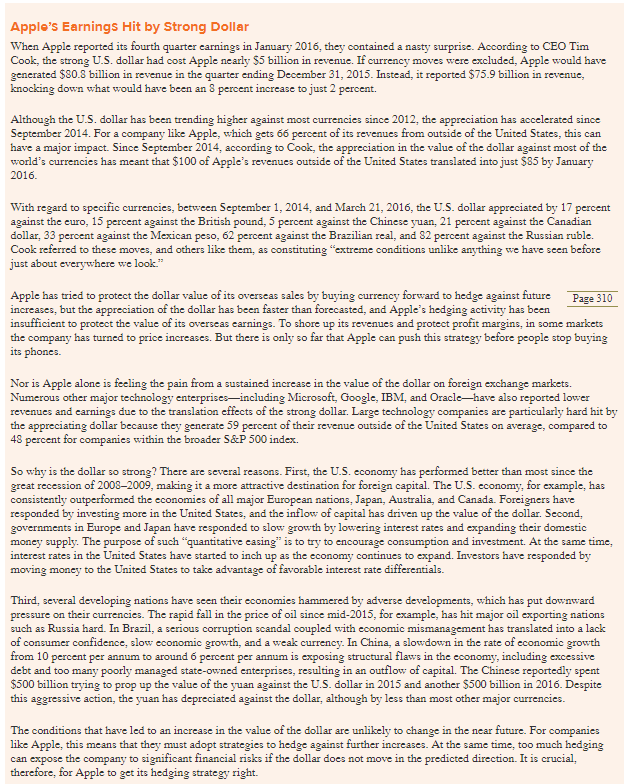Apple's Earnings Hit by Strong Dollar When Apple reported its fourth quarter earnings in January 2016, they contained a nasty surprise. According to CEO Tim Cook, the strong U.S. dollar had cost Apple nearly $5 billion in revenue. If currency moves were excluded, Apple would have generated $30.8 billion in revenue in the quarter ending December 31, 2015. Instead, it reported $75.9 billion in revenue knocking down what would have been an 8 percent increase to just 2 percent. Although the U.S. dollar has been trending higher against most currencies since 2012, the appreciation has accelerated since September 2014. For a company like Apple, which gets 66 percent of its revenues from outside of the United States, this can have a major impact. Since September 2014, according to Cook, the appreciation in the value of the dollar against most of the world's currencies has meant that $100 of Apple's revenues outside of the United States translated into just $85 by January 2016. With regard to specific currencies, between September 1, 2014, and March 21, 2016, the U.S. dollar appreciated by 17 percent against the euro, 15 percent against the British pound, 5 percent against the Chinese yuan, 21 percent against the Canadian dollar, 33 percent against the Mexican peso, 62 percent against the Brazilian real, and $2 percent against the Russian ruble. Cook referred to these moves, and others like them, as constituting "extreme conditions unlike anything we have seen before just about everywhere we look." Apple has tried to protect the dollar value of its overseas sales by buying currency forward to hedge against future increases, but the appreciation of the dollar has been faster than forecasted, and Apple's hedging activity has been Page 310 insufficient to protect the value of its overseas earnings. To shore up its revenues and protect profit margins, in some markets the company has turned to price increases. But there is only so far that Apple can push this strategy before people stop buying its phones. Nor is Apple alone is feeling the pain from a sustained increase in the value of the dollar on foreign exchange markets. Numerous other major technology enterprises-including Microsoft, Google, IBM, and Oracle-have also reported lower revenues and earnings due to the translation effects of the strong dollar. Large technology companies are particularly hard hit by the appreciating dollar because they generate 59 percent of their revenue outside of the United States on average, compared to 43 percent for companies within the broader S&P 500 index. So why is the dollar so strong? There are several reasons. First, the U.S. economy has performed better than most since the great recession of 2008-2009, making it a more attractive destination for foreign capital. The U.S. economy, for example, has consistently outperformed the economies of all major European nations, Japan, Australia, and Canada. Foreigners have responded by investing more in the United States, and the inflow of capital has driven up the value of the dollar. Second, governments in Europe and Japan have responded to slow growth by lowering interest rates and expanding their domestic money supply. The purpose of such "quantitative easing" is to try to encourage consumption and investment. At the same time, interest rates in the United States have started to inch up as the economy continues to expand. Investors have responded by moving money to the United States to take advantage of favorable interest rate differentials. Third, several developing nations have seen their economies hammered by adverse developments, which has put downward pressure on their currencies. The rapid fall in the price of oil since mid-2015, for example, has hit major oil exporting nations such as Russia hard. In Brazil, a serious corruption scandal coupled with economic mismanagement has translated into a lack of consumer confidence, slow economic growth, and a weak currency. In China, a slowdown in the rate of economic growth from 10 percent per annum to around 6 percent per annum is exposing structural flaws in the economy, including excessive debt and too many poorly managed state-owned enterprises, resulting in an outflow of capital. The Chinese reportedly spent $500 billion trying to prop up the value of the yuan against the U.S. dollar in 2015 and another $500 billion in 2016. Despite this aggressive action, the yuan has depreciated against the dollar, although by less than most other major currencies. The conditions that have led to an increase in the value of the dollar are unlikely to change in the near future. For companies like Apple, this means that they must adopt strategies to hedge against further increases. At the same time, too much hedging can expose the company to significant financial risks if the dollar does not move in the predicted direction. It is crucial, therefore, for Apple to get its hedging strategy right







